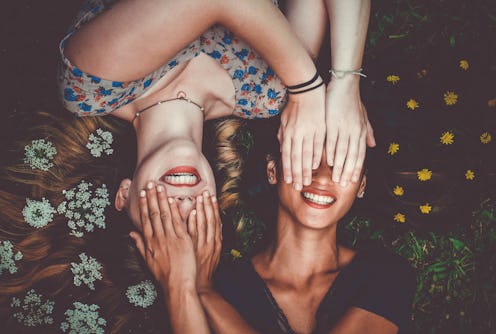Life
This Is Why We Celebrate International Day Of The Girl
Every year since 2012, we celebrate the International Day of the Girl on Oct. 11, to recognize how hard being a girl is even to this day. The United Nations created the holiday, sometimes called International Day of the Girl Child, to celebrate the potential of the girls in different cultures around the world, and to highlight the threats, discrimination, and issues facing their well-being. Girls worldwide deserve better: better education, better survival rates, better protection from child marriage and sexual assault, better access to resources, better health outcomes, and a better future. It's a very tall order considering some of the challenges afoot, but the UN and others are hopeful that Oct. 11 can be a rallying cry with which to empower girls worldwide.
Making the world better for girls makes the world better for everybody, period. The World Bank, for instance, points out that girls with education grow into women who "tend to be healthier, participate more in the formal labor market, earn higher incomes, have fewer children, marry at a later age, and enable better health care and education for their children, should they choose to become mothers." These factors combined, they say, "help lift households, communities, and nations out of poverty" — but UNESCO notes that 116 million women across developing countries worldwide have never completed primary school, and that two-thirds of the illiterate population worldwide are female. The costs of holding girls back are big for everybody. This International Day of the Girl, we remember these inequities while celebrating girls' resilience and strength.
What International Day Of The Girl Hopes To Do
The International Day of the Girl isn't just about fundraising and raising awareness; it's also about collecting data to learn as much as we can. Girls worldwide often slip through the net of data collection, meaning we have an unclear idea of how they live and what they need. The theme of 2017's October 11 celebration is “Girls’ Progress = Goals’ Progress: A Global Girl Data Movement", because, as the United Nations writes, we need more numbers to help more girls:
"There are 1.1 billion girls today, a powerful constituency for shaping a sustainable world that’s better for everyone. They are brimming with talent and creativity. But their dreams and potential are often thwarted by discrimination, violence and lack of equal opportunities. There are glaring gaps in data and knowledge about the specific needs and challenges that girls face."
The issues that demand attention and research are vast. Child marriage is a particular threat to girls worldwide; the very first International Day of the Girl was designed to shed light on the practice, and it's believed that globally, nearly one in three girls are married before they turn 18, and one in seven before they turn 15. 700 million women alive today were married under 18, usually to men much older than themselves. But that's not the only issue that the Day hopes to highlight. UNICEF estimates that 130 million girls worldwide have experienced female genital mutilation, that females make up 80 percent of the 800,000 people trafficked annually, and that up to 50 percent of all sexual assaults worldwide target girls under the age of 16. It's not a safe or healthy world for girls, and that affects everybody.
How You Can Help
Around the world, cities and organizations use the #DayOfTheGirl to unite activists who want to change things for girls. An 11-day summit on health, happiness and activism revolving around girls happens every year at the United Nations; organizations like UNICEF hold events, classes and fundraisers worldwide, from Washington, D.C., to Istanbul; and PLAN International, one of the instigators of the #DayOfTheGirl idea, hosts massive events. This year, they've engineered a "girl takeover" all over the world, in which 600 girls will step into the shoes of leaders, presidents, mayors and CEOS for a day on Oct. 11.
Inspired? See what's happening to celebrate the #DayOfTheGirl in your city at DayOfTheGirl.org, which monitors the day's events all over the world. Host your own event to raise funds and awareness for organizations that support empowering girls, from the Invisible Girl Project to CARE International, She's the First, or the Malala Fund. Lift up girls in your community by volunteering with places like the Girl Scouts (not just for the cookies). And remind every girl you know that they're, talented, essential, and deserve the best from the world.
